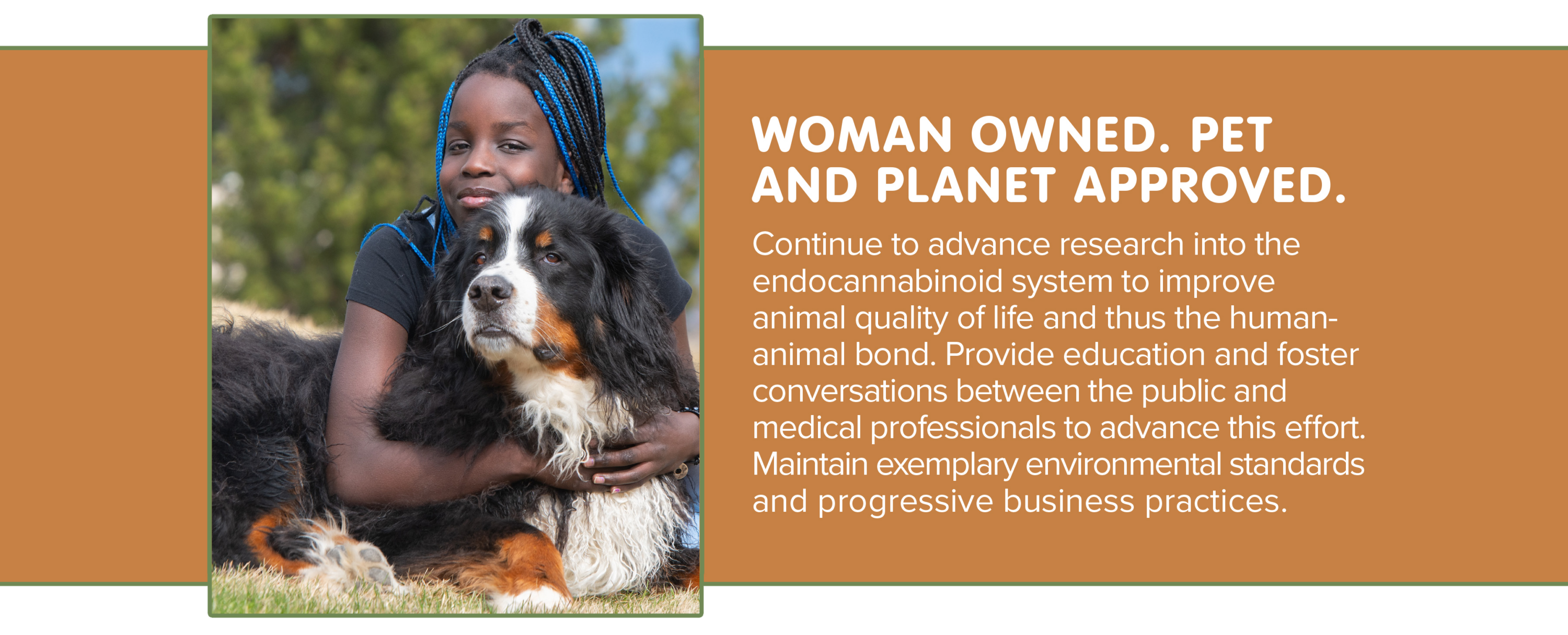What is the Difference between Pet CBD and Human CBD?
The CBD industry is, without question, booming. Although there may not be federal organizations publishing official studies, there is still significantly more research available about CBD – for humans, that is. And two things are very clear from existing human consumers: it works and people love it.
So why can’t we just use those popular, human CBD brands for our pets? What is the difference? We’re diving into these questions and more to show you why it’s so important to select your pet supplements carefully.
What is the difference between pet CBD and human CBD?
We’ll be upfront with you. The answer is that there really isn’t a difference.
However, sharing your CBD with your four-legged friends is not necessarily a good idea. In fact, it can be dangerous to your pet and cause unintended harm.
Most of the time, it has nothing to do with the actual CBD formulation itself. Many brands will add certain elements to their products to make it easier for consumption.
Think of vitamin supplements you might find at a CVS or grocery store. They are often flavored with fruits to make taking your vitamins a lot more pleasant. In the same way, human CBD supplements often have added flavors like peppermint or chocolate to make it a fun experience. As you can imagine, most pets may not be fond of these flavors.
More notably, CBD brands create concentrations that are easily administered to their target consumer. For instance, a human CBD oil might make one serving a dropper-full of oil. However, what is calculated to be one serving for a human will not be the same for your pet.
The quantity and concentration of product varies between pet CBD and human CBD, meaning that you could potentially put your companion at risk by sharing your CBD products with them.
What happens if you give too much CBD to your pet?
Human CBD is usually formulated at a higher concentration than pet CBD. This creates a risk around the amount of CBD you are administering, meaning your pet could experience adverse effects, toxicity, or overdose.
Let’s get into what each of these mean.
Adverse Effects
An adverse effect is an undesirable reaction which, in this case, is a result of CBD administration. This will likely manifest as mild and quickly reversible upset to your pet such as drowsiness or lethargy, upset stomach, and in some cases, diarrhea.
It is simple to reduce the risk of such potential adverse effects by following recommended guidelines like administering the supplement during or after mealtimes. Adverse effects are seen in the general population at labeled quantities of a given product but considered acceptable, or low risk, relative to the potential benefits.
Toxicity
Products that are not manufactured with your pet’s needs in mind may contain elements that are poisonous to your companion. Toxicity occurs when your pet is exposed to these poisons, potentially causing death or serious debilitation.
While many claim that cannabis cannot pose a toxic risk –and that does apply to the natural plant with small quantities of compounds– both CBD and THC can cause serious debilitation and death at extreme amounts. It is important to note that the amount it takes for this is highly variable and is based on individual response.
With toxicity, the symptoms are more severe than adverse effects. Lethargy progresses to coma, respiratory depression progresses to levels that prohibit adequate oxygenation without support, extremely low blood pressure puts significant stress on most organ systems, potentially causing long term effects if the patient survives the insult, etc.
In the case of cannabis supplements (CBD, THC, hemp), toxicities tend to be managed with aggressive medical management, such as IV fluids, oxygen supplementation, protective drugs for whatever system is involved most, etc., and time. Most of the compounds’ effects wear off after 2-3 days.
Although this information may deter you from using CBD supplements from your pet – it shouldn’t. Being equipped with this knowledge gives you greater power to care for your pet in the best way possible. It also emphasizes the importance of selecting the right product for your four-legged friend.
Overdose
An overdose is a dose that is too large and results in adverse or lethal reactions. This is what happens when the quantity administered is greater than the recommended amount and can have severe consequences.
Contrary to popular belief, CBD overdose can occur in pets, but the quantity required to get there is highly variable and is dependent upon several factors including:
- Age
- Species
- Presence of other compounds
- Hydration status
- Cardiovascular, neurological and other individual sensitivities
Similar to toxicity, symptoms are more severe with overdose. Lethargy now prohibits your pet from assuming normal daily activities; GI upset causes protracted vomiting and extreme diarrhea. The body begins to have troubles with more critical areas: low blood pressure, poor reaction times, lowered respiration rate, elevated or lowered heart rate – and can cascade into long term effects if not corrected (e.g. respiratory collapse).
To be clear, CBD overdose is rare. In fact, it is usually the result of humans leaving their high-potency CBD extracts out where a child or pet can ingest the whole thing. Another overdose potential is a well-meaning pet parent giving an unknown quantity (usually homemade, improper potency on the label, etc.) or extremely large quantity (such as by using a human CBD product) to a dog or cat.
Here’s the kicker: some overdoses require immediate medical attention while others require time. So, how can you tell the difference? It’s all in the symptoms:
If your pet…
- Takes the appropriate labeled amounts, but shows more fatigue than normal
- Experiences mild GI upset, such as soft-formed stool, slightly off feed, etc.
- Or shows any of the above symptoms after taking 2x the labeled quantity
Speak with your veterinarian and call Canna Companion for a consultation. Always contact your attending veterinary doctor before us.
If your pet…
- Ingested a quantity 3-4x the labeled quantity
- Wobbles while walking, but can stand unaided
- Can drink water properly
- Presents mild GI upset, such as lip licking, refusing food, mild diarrhea, etc.
- Shows less interest in pets, treats, and regular activity
Monitor your pet throughout the day and call your veterinarian in the morning if the symptoms do not change.
If your pet…
- Is unable to get up unaided or with minimal help
- Is unable to eat or drink without assistance
- Has ingested a known large quantity (even if no symptoms are present yet)
- Exhibits delayed responses (difficulty or inability to wake from a nap or when wakes is too groggy to greet you)
- Shows protracted GI upset (continued vomiting or retching, ongoing diarrhea, GI cramping)
- Displays odd changes in behavior (depression to mania)
- Or any other symptoms that cause severe concern
Call your veterinarian or local veterinary emergency hospital immediately.
In addition to ‘overdose’, it is important to consider that there are other components in CBD products. For instance, CBD is fat-soluble, which means that infusing it with a good quality oil (also called a carrier oil) can increase its bioavailability. Therefore, in addition to pure CBD being potentially life-threatening in large quantities, both CBD & certain types of carrier oils (specifically MCT) can cause gastrointestinal upset.
Manufacturers of these products specifically take all these things into consideration and design products that give you more clarity in how much to give your pet. For instance, Canna Companion’s has weight-based recommendations that come with our products and we offer free consultations to guide you through the safety guidelines of administering CBD.
Make Sure Your CBD Is Up To Snuff
So no, there is not a huge difference between pet CBD and human CBD, but the concentrations vary in a way that just makes it safer to provide your pet with the best supplement you can offer them.
When selecting the right CBD pet supplement for your four-legged friend, be sure to look for high-quality products that are custom formulated for companion animals.
One way to do this is to only purchase from brands that provide you with a Certificate of Analysis (COA) for each batch of product. To make the search for the right product even easier, choose brands that are certified by the National Animal Supplement Council’s quality seal.
At Canna Companion, we are committed to transparency and care for your pet, which is why we offer one-on-one consultation with our licensed veterinary professionals to give you the best custom care and recommendations. Book a free consultation or shop our products today.
All Canna Companion Blogs are approved by veterinary professionals including the product development veterinarians.





